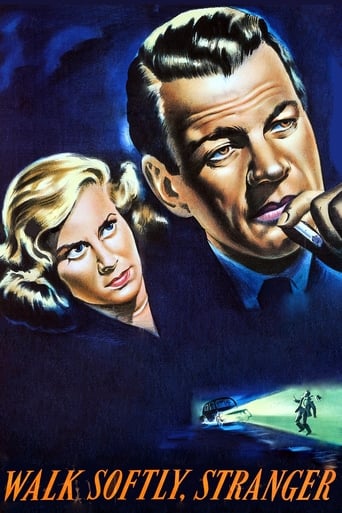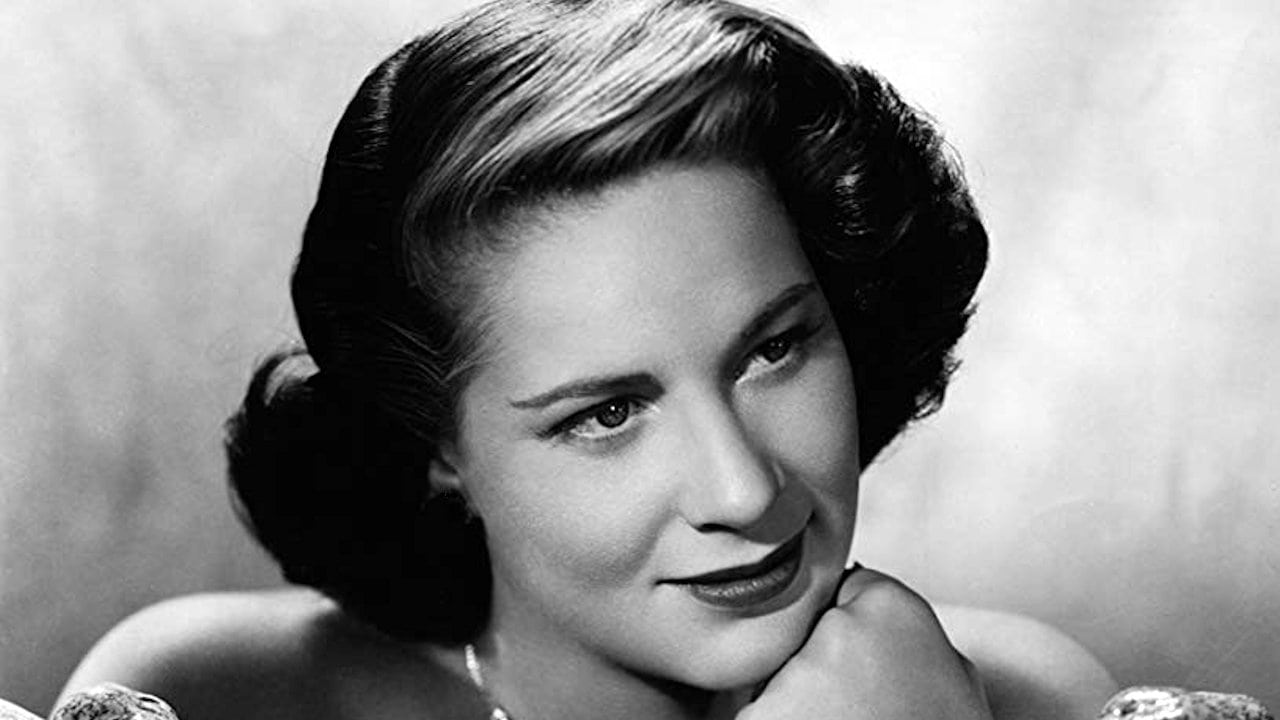MartinHafer
Completed in 1948 but not released until 1950. This would seem to be the kiss of death for a film as usually this means a film is a mess and the studio doesn't know what to do with it. Sometimes they redo parts of the story and sometimes they just cut their losses and release it--either way, a film that's pulled off the shelf is NOT a sure sign of a successful film! Sure, there are a few exceptions (such as the recent "Tucker and Dale Versus Evil"), but most such films are duds. Is "Walk Softly Stranger" a dud? Read on...This is a confusing film. Now this is NOT meant as a criticism but more a reflection on the sort of character Joseph Cotten plays in this movie. You just aren't sure what sort of man he really is. The film begins with Cotten arriving in a small town. He announces that he'd lived there as a kid and has now returned but you can't get past the idea that this is a con. You doubt his motives even more when you see he's living two lives--one as an employee at the local show factory and the other as a professional gambler and thief! And, while he definitely has a hard side, he also begins dating a lady in a wheelchair (Alida Valli) who thinks no man could even want her. What gives?! A 'nice' crook with a heart of gold?! And, is he really Chris Hale? Ultimately, it turns out even he doesn't know! All this story leads to one of the best finales I've seen in a film of this era. Just stay tuned to the exciting car scene--it is simply brilliant and I don't know how they managed to make it look so real. Gripping--that's for sure.An excellent sleeper--why did these idiots hold on to this excellent movie so long?!
hcoursen
This one features a typically restrained performance by Cotton, a strong depiction of his weasly partner and moral antithesis by Paul Stewart and, as always, good supporting work by the ebullient Spring Byington. The star, however, is Valli, who moves from a vulnerable cripple to a radiant smile as some kids sing a Christmas carol to her through the window of Cotton's wonderful Packard convertible. The film may end unconvincingly, as some auditors argue, but at least it ends in a minor key. The effective opening 3/4 may have earned that ending. But see it for Valli, who (as someone suggested) should have gotten an Oscar for this one.
cutterccbaxter
Valli looks as beautiful and depressed as ever in this film. She always had a sad aura about her and the producers were wise to stick her in a wheel chair where they could make good use of her gloomy vibe. This is a story that seems to know where it wants to go and I found myself engrossed in it, but I found the ending to be less than satisfactory. Joseph Cotten takes three slugs in the back and the car he is in rolls over about six times and yet he doesn't die?!? Maybe if he had been wearing his seat belt I might of accepted him living and ending up in a wheel chair. Then he and Valli could have wheeled off into the sunset together. Paul Stewart is fun to watch in this film. His eyes remind me of a raccoon, yet he's one hundred percent weasel.
bmacv
A sad little film noir wrapped inside a sad little love story (or vice versa), Walk Softly, Stranger maintains a subdued integrity of tone throughout. You wish it would get a move on, or that the exchanges were snappier, or the rhythms quirkier. But, no, and at the end, you have to admit that, on its own modest terms, it succeeds. Into the heartland of Ohio drifts grifter Joseph Cotten to settle down in one of those small cities that used to be famous for something in this case, it's the headquarters of Corelli Shoes, where he wangles himself a job. Cotten lets on that he's returning to the home town he ran away from years before even taking up room and board with Spring Byington, a widow who now owns what used to be his house. But it's all a lie (or at least seems to be; the script sends mixed messages on this point). He's researched the history of the house and the widow, and also that of the Corelli heiress (Valli; she had dropped the `Alida'), a lonely rich girl crippled in a skiing accident. He hopes to romance her so as to be sitting pretty for the rest of his days his ultimate con job. But he ends up falling for her.Cotten's Achilles heel, however, has always been his professional vanity, and he can't pass up one last job robbing a mob boss of his casino's take. The job succeeds, but his certified loser of an accomplice (Paul Stewart), now down and out, tracks him down and blows both their covers. They're both marked men....Walk Softly, Stranger, opts for a bittersweet, romantic ending rather than a terminal blow-out, and that's in keeping with all that goes before. But problems remain. Cotten's performance reminds us, in its watered-down way, of his Uncle Charlie in Hitchcock's Shadow of a Doubt, while Valli has little to do but stay tragically, enigmatically glamorous. (The most memorable performances come from Byington and Stewart, and the movie is notable for preserving one of the few appearances on film of Jack Paar, who was to imprint The Tonight Show with his particular personality in the late 50s and early 60s). It's a strange, flawed movie whose elegiac tone stays with you.


 AD
AD




